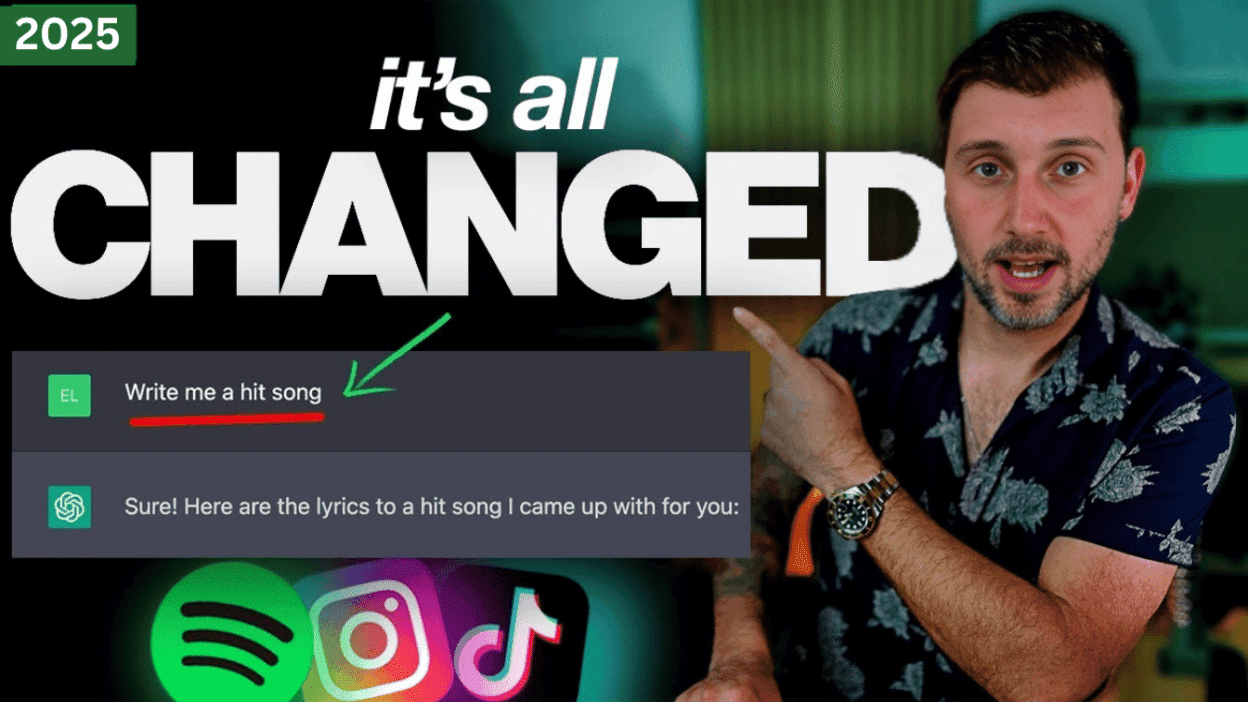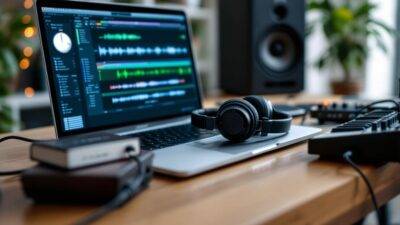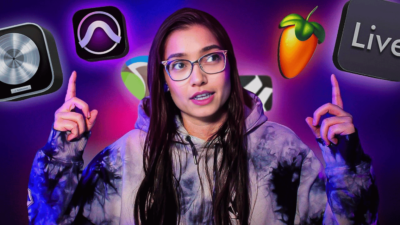AI music production is reshaping the landscape of the music industry. From automated mixing to AI-assisted composition, these technologies are transforming how we create and produce music.
At chordx, we’ve witnessed firsthand the impact of AI on streamlining workflows and expanding creative possibilities. In this post, we’ll explore the tools, benefits, and challenges of AI in music production, and consider its future role in shaping the industry.
AI Tools Transforming Music Production
AI-powered tools are revolutionizing music production, changing not only how we create music but also who can create it.
Automated Mixing and Mastering
Professional-sounding tracks are no longer exclusive to those with deep pockets. AI-driven platforms like LANDR and iZotope’s Ozone have democratized the mixing and mastering process. These tools use machine learning algorithms to analyze tracks and apply professional-grade processing in minutes.
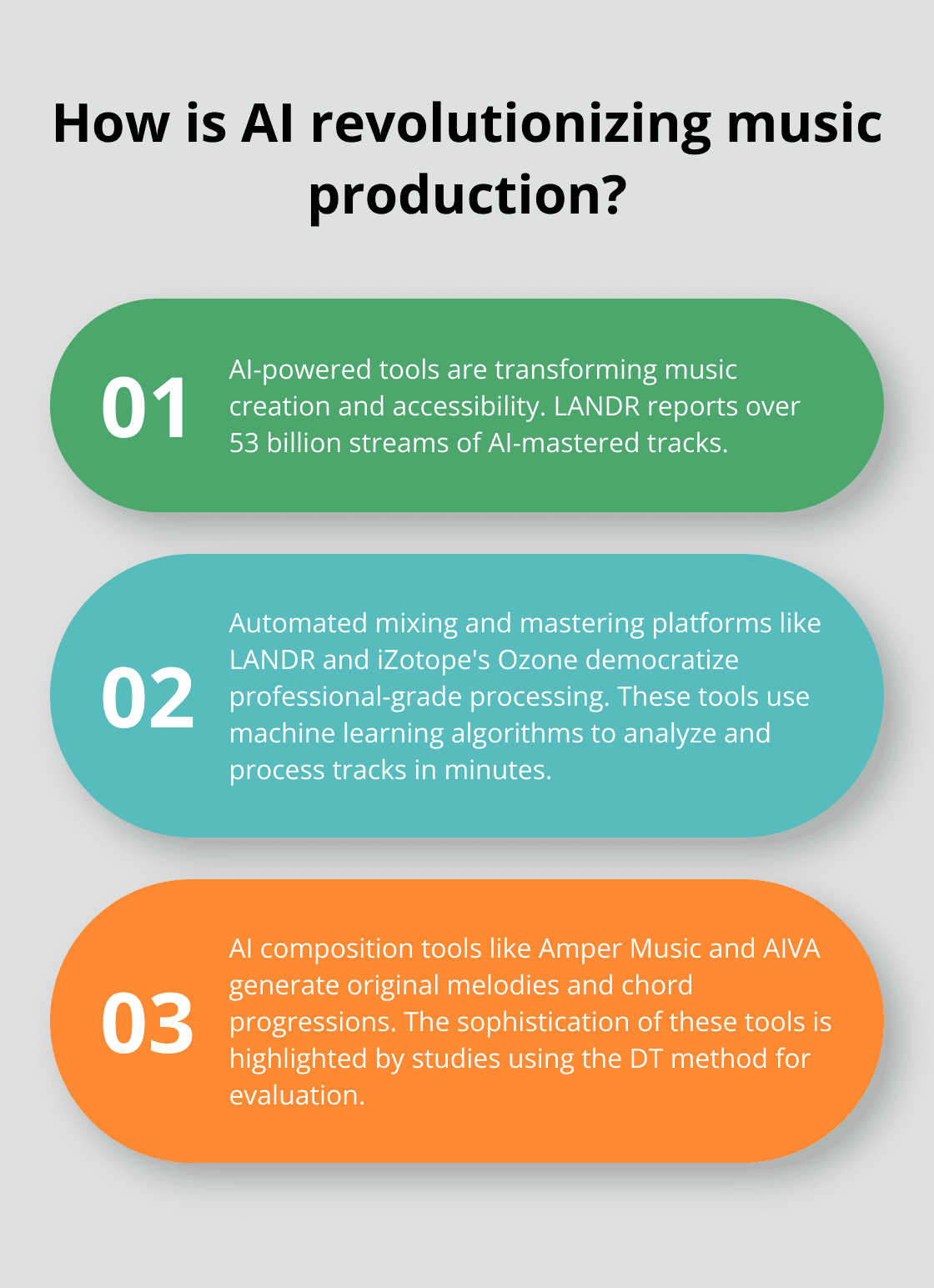
LANDR reports that tracks mastered through their platform have been streamed over 53 billion times (showcasing the widespread adoption of AI in this space). These tools don’t just save time; they also improve the overall quality of music production, especially for independent artists who might not have access to high-end studios.
AI in Composition and Songwriting
AI is making significant strides in the creative process itself. Tools like Amper Music and AIVA push the boundaries of what’s possible in music composition. These platforms can generate original melodies, chord progressions, and even full tracks based on user inputs.
A study by Pearce and Wiggins proposed the DT, where “the generated music can be evaluated by asking human subjects to distinguish compositions taken from the data set from those generated by the system” (highlighting the sophistication of these tools). However, AI should be seen as a collaborator rather than a replacement for human creativity.
Virtual Instruments and Sound Design
AI has transformed the realm of virtual instruments and sound design. Plugins like Arturia’s Pigments and Native Instruments’ Kontakt incorporate machine learning to create more realistic and expressive virtual instruments.
Moreover, AI-powered sound design tools like LANDR’s Samples use machine learning to generate unique sounds and textures. This technology allows producers to create custom sound palettes that were previously unimaginable or too time-consuming to produce manually.
While these AI tools are powerful, they’re most effective when combined with human creativity and expertise. The future of music production lies in the synergy between human creativity and AI assistance. As we move forward, we’ll explore how this synergy impacts the creative process and workflow efficiency in music production.
How AI Transforms the Creative Process
Streamlining Workflow
AI tools reduce the time spent on technical aspects of music production. Automated mixing and mastering services cut post-production time by up to 70%. This allows producers to focus more on the creative aspects of their work.
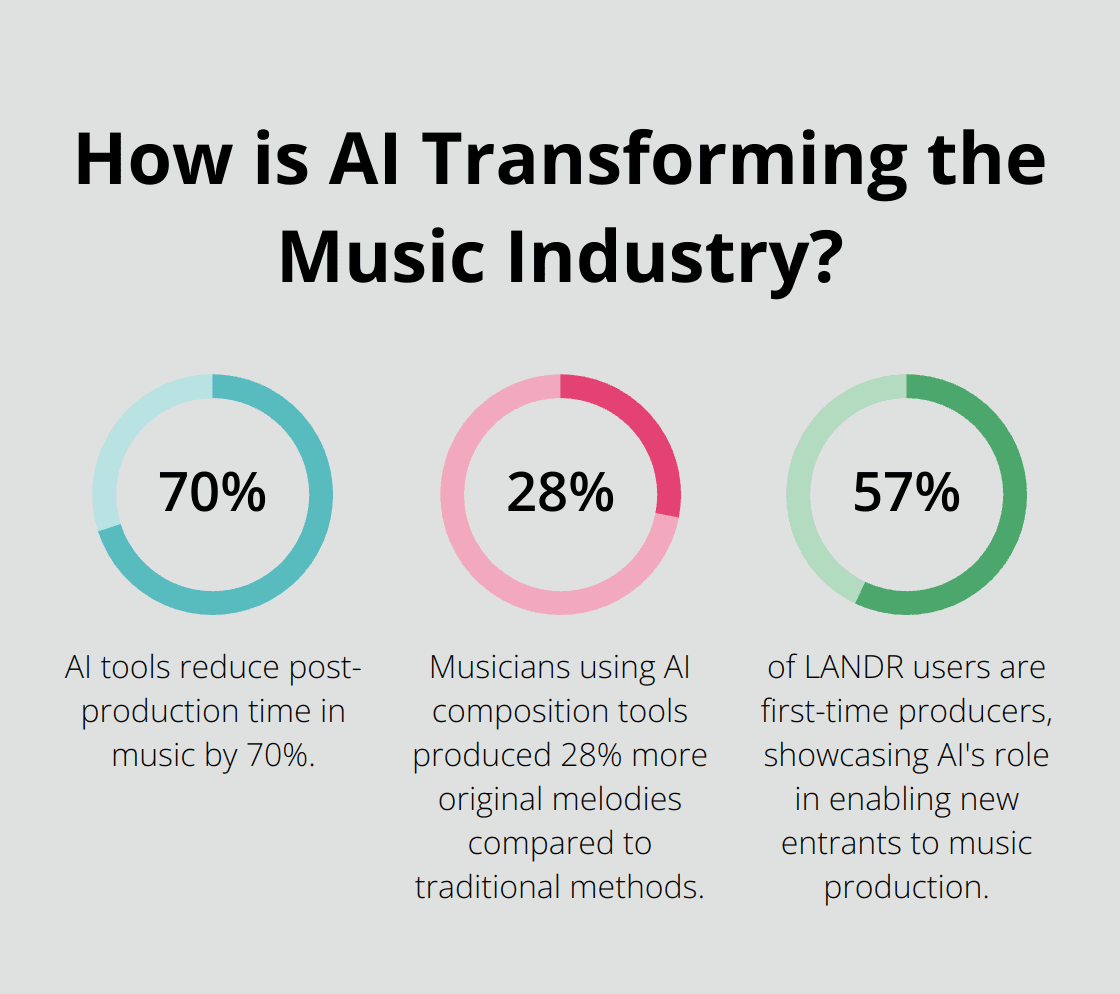
AI-powered plugins help quickly set up project templates, which frees up more time for experimentation and ideation. Some producers report finishing tracks 40% faster after incorporating AI tools into their workflow.
Pushing Creative Boundaries
AI acts as a creativity amplifier, not just a time-saver. AI Synth Generators are revolutionizing the way producers create synth sounds, making it easier than ever to craft unique, complex, and inspiring tones. This sparks new ideas and inspires innovative sound design.
A University of California, Santa Barbara study found that musicians using AI composition tools produced 28% more original melodies compared to those using traditional methods. This suggests that AI helps break creative blocks and inspires new directions in music production.
Lowering Barriers to Entry
AI democratizes music production. Tools once exclusive to professional studios are now accessible to bedroom producers. This levels the playing field and allows a wider range of voices to be heard in the music industry.
AI-assisted EQ and compression tools analyze tracks and suggest optimal settings. This gives novice producers a professional-sounding mix without years of experience. The music tech company LANDR reports that 57% of their users are first-time producers (highlighting how AI enables more people to enter the world of music production).
Balancing AI and Human Creativity
While AI offers powerful tools, it’s crucial to remember that it’s not a replacement for human creativity. The most successful producers harness AI to enhance their creativity, not replace it. They develop a unique artistic voice alongside technical skills.
As AI continues to evolve, its impact on the creative process will only grow. Producers must stay informed about these tools and learn how to integrate them effectively into their workflow. This knowledge empowers them to leverage AI’s capabilities while maintaining their artistic vision.
The next chapter will explore the challenges and concerns that arise from the increasing use of AI in music production. We’ll examine potential drawbacks and ethical considerations that come with this technological revolution.
The Dark Side of AI in Music Production
The Homogenization of Sound
AI in music production risks homogenizing sound. As more producers rely on AI-generated melodies, beats, and mixing techniques, music might become formulaic and lack individuality.
AI in music creation has led to the development of various tools that can generate musical compositions, beats, and entire songs using machine learning. To combat this, producers should use AI as a starting point rather than a final product. Try unconventional combinations of AI-generated elements and your own unique ideas to create truly original music.
Copyright Conundrums
The rise of AI in music production has created a legal minefield for copyright. Who owns the rights to a song partially composed by AI? How do we attribute royalties when an AI system has been trained on copyrighted material?
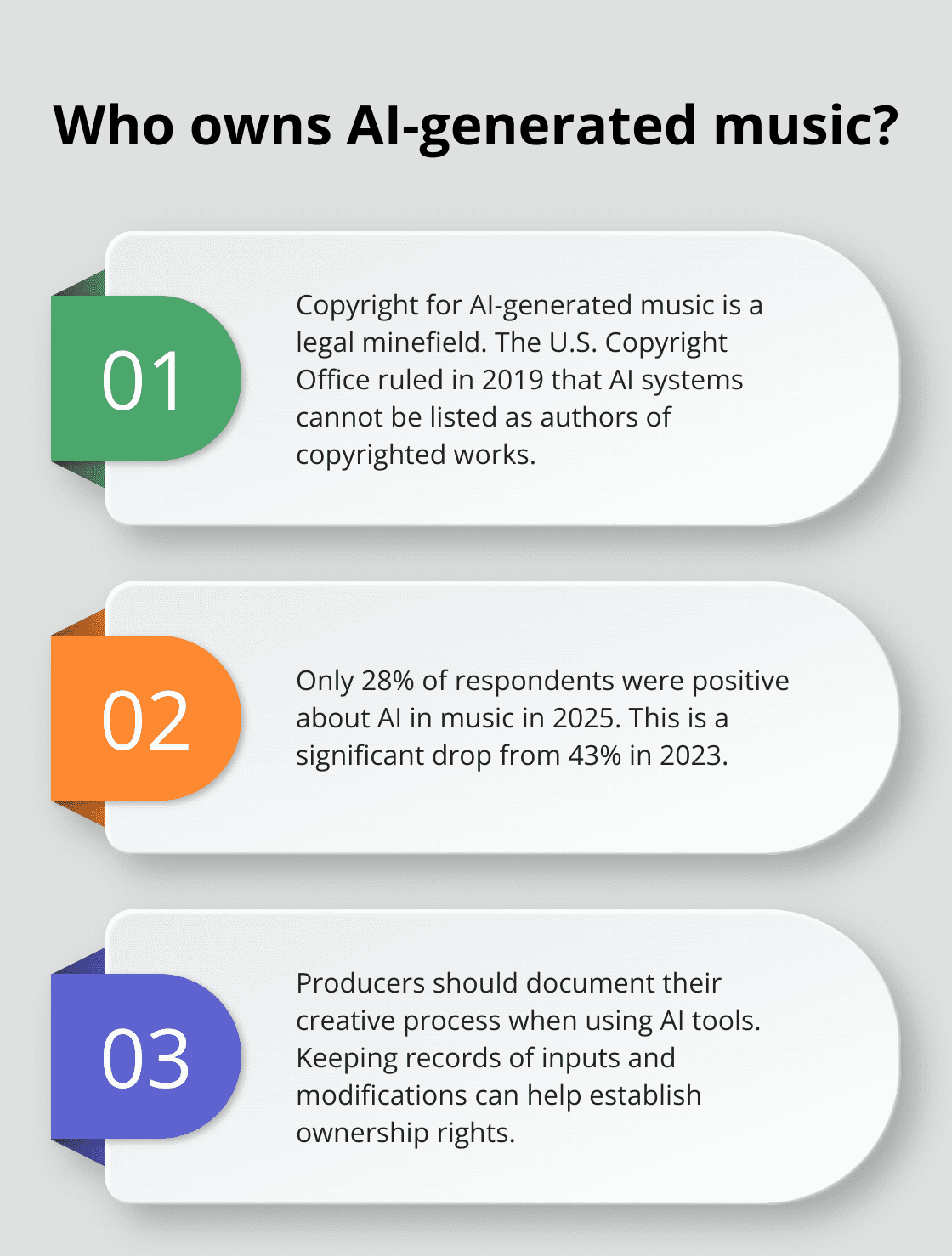
These questions are still debated in courts and boardrooms around the world. In 2019, the U.S. Copyright Office ruled that an AI system cannot be listed as the author of a copyrighted work. However, the legal landscape continues to evolve.
To protect yourself, always document your creative process when using AI tools. Keep records of the specific inputs you provide to AI systems and how you modify the outputs. This documentation can prove crucial in establishing your creative contribution and ownership rights.
The Human Element at Risk
While AI tools can enhance efficiency and spark creativity, there’s valid concern about the potential loss of the human touch in music production. The nuances of emotion and personal experience that make music truly resonate with listeners can’t be replicated by algorithms alone.
A recent survey found that only 28 percent of respondents were positive about the use of AI in music, a significant drop from 43 percent in 2023. To address this, view AI as a collaborator rather than a replacement. Use AI to handle repetitive tasks or generate ideas, but always infuse your personal touch into the final product.
Balancing AI and Human Creativity
The future of music production lies in striking a balance between AI assistance and human creativity. Producers should focus on developing their unique artistic voice alongside technical skills. Courses that emphasize creativity and help you find your signature sound (like those offered by Edm) can be invaluable in this process.
Ethical Considerations
As AI becomes more prevalent in music production, ethical questions arise. Should AI-generated music be labeled as such? How do we ensure fair compensation for human artists in an AI-dominated industry? These issues require ongoing discussion and careful consideration as the technology continues to advance.
Final Thoughts
AI has revolutionized music production, offering tools that enhance creativity and democratize access to professional techniques. These technologies expand the possibilities in music creation, but they also present challenges such as potential loss of human touch and copyright issues. The future of AI music production requires a balance between technological assistance and human creativity, with AI serving as a tool to amplify artistic vision.
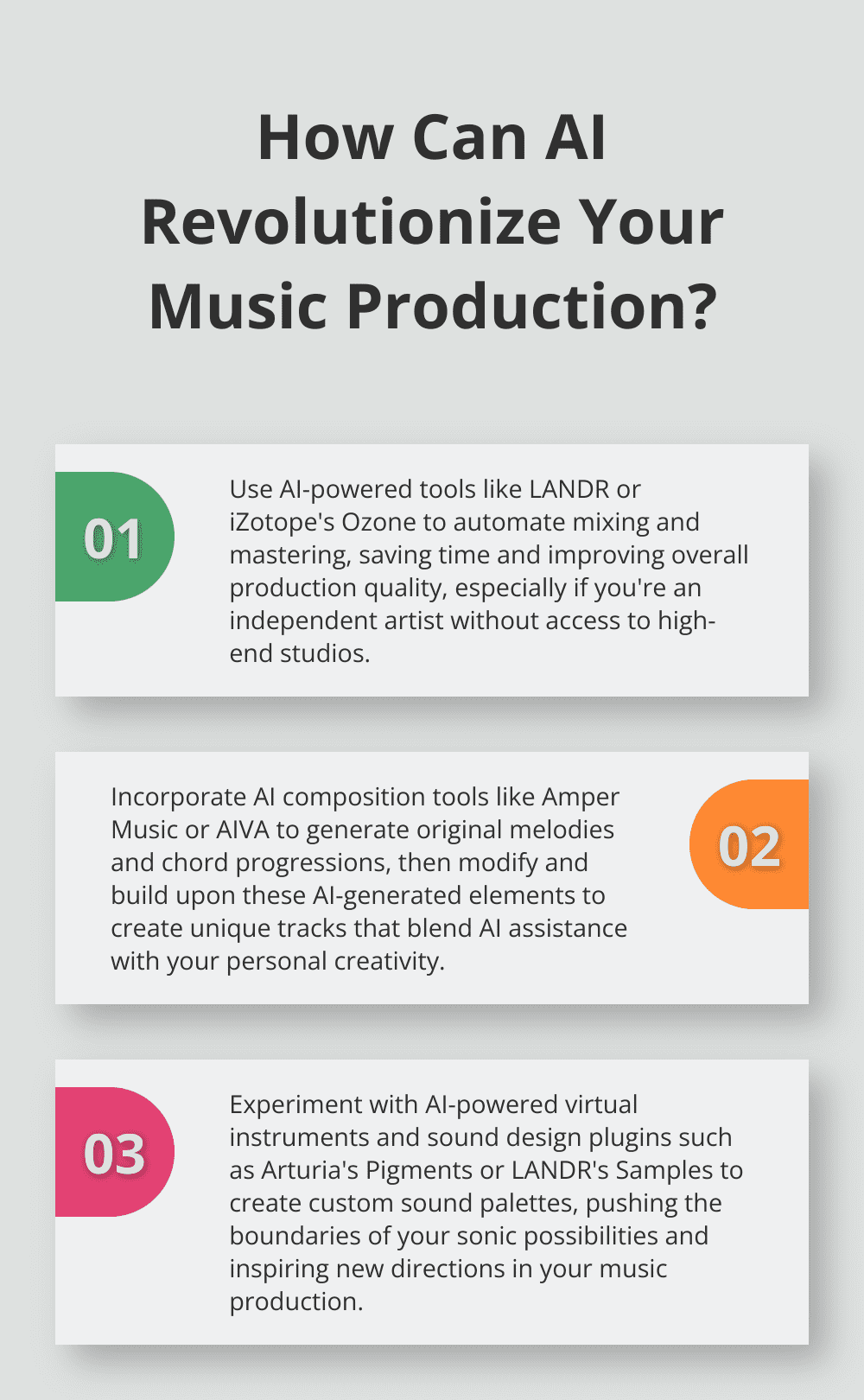
Producers must stay informed about AI developments and experiment with new tools while refining their craft. At Edm, we recognize the importance of developing both technical proficiency and creative expression in music production. Our comprehensive educational platform offers personalized coaching and diverse courses to help navigate the evolving landscape of AI music production.
The future of music production holds exciting possibilities. By combining AI power with human creativity, we can create more innovative and impactful music than ever before. AI in music production will continue to evolve, and successful producers will effectively blend AI-powered tools with their creative instincts and technical skills.
